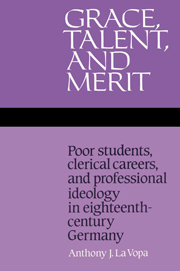 Grace, Talent, and Merit
Grace, Talent, and Merit Book contents
- Frontmatter
- Contents
- Acknowledgments
- Introduction
- PART I POOR STUDENTS
- PART II CALLING, VOCATION, AND SERVICE
- PART III NEW DEPARTURES
- 9 Orthodoxies and new idioms
- 10 Professional ideologies: the making of a teaching corps
- 11 The clerical identity
- 12 Radical visions: Johann Gottlieb Fichte
- Epilogue
- Bibliographical note
- Index
10 - Professional ideologies: the making of a teaching corps
Published online by Cambridge University Press: 26 March 2010
- Frontmatter
- Contents
- Acknowledgments
- Introduction
- PART I POOR STUDENTS
- PART II CALLING, VOCATION, AND SERVICE
- PART III NEW DEPARTURES
- 9 Orthodoxies and new idioms
- 10 Professional ideologies: the making of a teaching corps
- 11 The clerical identity
- 12 Radical visions: Johann Gottlieb Fichte
- Epilogue
- Bibliographical note
- Index
Summary
In the late eighteenth century the secular ethic of vocation became a vital idiom for new forms of collective consciousness as well as for new modes of individualism. The most striking case in point is the reform movement among teachers in the Latin schools and Gymnasien. Here again, though, a shift in vocabulary and rhetoric requires explanation. As early as the 1760s schoolmen had begun to fashion a professional ideology for their occupation. In the development of that ideology over the next two decades a larger trend is especially clear; the utilitarian ethic of Enlightenment rationalism was patterning into self-conscious – and self-serving – occupational identities. The rationalist ethic survived, albeit in muted form, into the nineteenth century; but it was overlaid by the idiom of Bildung, and the overlay signified important changes in defining the distinctive social status, intellectual foundation, and public function of an educated profession.
The term “professional ideology” requires its own introduction. In recent decades, on both sides of the Atlantic, there has been a noticeable rise in public resentment of the wealth, status, and power attached to at least some species of professional expertise. The new mood has provoked sociologists and historians to probe the historical origins of modern professionalism. Why have some occupational groups succeeded in persuading both the surrounding society and the state that, by virtue of the knowledge they command, they have a legitimate claim to a distinctive status?
- Type
- Chapter
- Information
- Grace, Talent, and MeritPoor Students, Clerical Careers, and Professional Ideology in Eighteenth-Century Germany, pp. 287 - 325Publisher: Cambridge University PressPrint publication year: 1988


